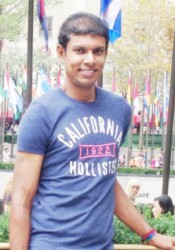After years of deliberation, journalist Leon Suseran has decided to come out as gay, saying that he believes that openness is the path to making the country a safe and welcoming place for Lesbian, Gay, Bisexual and Transgender (LGBT) persons.
“Given the current social climate of our society in terms of how persons perceive homosexuals, I have reached a point in my life where I could care less of what people think.
Today, I am living my best life ever and I owe it to myself as well as society out there to come clean as it were,” Suseran, 29, told Stabroek News in an interview.
He stated that while he hopes his coming out would improve the public image of the LGBT community in Guyana,

he was also unsure if it has a strong enough presence in the public sphere.
“I’m afraid that we cannot classify such a group since many gays and lesbians—as well as bisexuals—are on the down- low and choose not to even be honest with their own selves,” he said, while saying he hoped his coming out could be inspirational for other LGBT youth.
He recalled seeing other gay friends struggle with their sexuality and said it made them miserable. “To mess up people’s lives just—because of the pressures of society, family, even religion? No way! Not worth it. I prefer to be happy and be in charge of my own happiness; not let others be in charge of it for me,” he added.
Suseran also noted that Guyana’s social setting consistently promotes gender norms and a prescribed masculinity for young men. He concluded that ascribing a negative connotation to homosexuality has consistently been used to steer young men into behaving like perceived “real men.”
“You see, a lot of Guyanese males are caught up trying to promote that masculine image to the public.
And rightfully so! If they do not, they will be called homos and sissies by their buddies and society! They will not measure up to what it means to be a man—‘a real man,’” Suseran stated.
He also noted that new derogatory names for gay men, like ‘Chi-Chi man,’ have been invented through the Caribbean lexicon and dialect that springs forth from anti-gay music, such as dancehall, and he questioned the effectiveness of the current gay rights organisations within Guyana.
“I believe there is a gay rights group—if I may even call it that—in Guyana. But who are these people? Who are the members? What are they about?
What are they fighting for? Why do they appear to be in hiding? Surely they too are afraid of being identified with the homosexual community!
This cannot take us anywhere if we are to make Guyana a safe and welcoming place for gays and lesbians,” he said, while noting that he has never reached out to the Society
Against Sexual Orientation Discrimination (SASOD), which has been working as an advocacy group since 2003.
As a practising Catholic Suseran acknowledged that the church does not and will never condone homosexual lifestyles and sexual habits. “…But the church has always been a home of both saints and sinners, in the past and very much so in the present. I guess I will have to draw the line of the teachings of the church right there for me,” he said.
He also said that he was ready for the ramifications of coming out. “I am fully aware that persons I know might want to disassociate themselves from me; some will act like they never knew me; others might withdraw their friendship slowly,” he noted, while adding that there are also people throughout Guyana that will support and understand his need to be honest.




